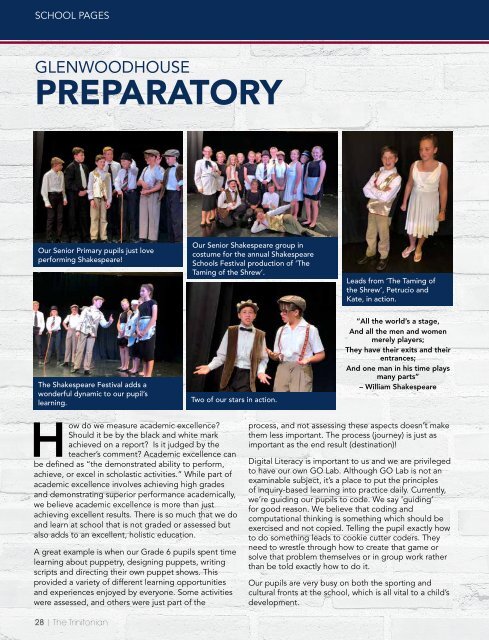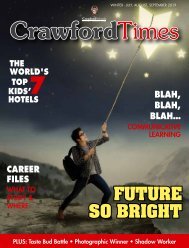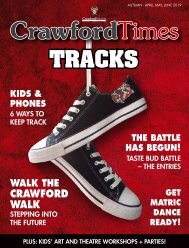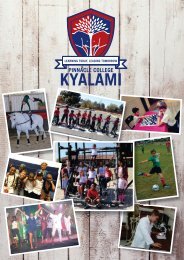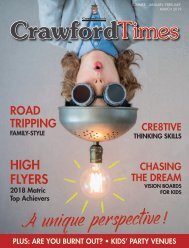TRINITONIAN 14 July 2019
Create successful ePaper yourself
Turn your PDF publications into a flip-book with our unique Google optimized e-Paper software.
SCHOOL PAGES<br />
GLENWOODHOUSE<br />
PREPARATORY<br />
Our Senior Primary pupils just love<br />
performing Shakespeare!<br />
Our Senior Shakespeare group in<br />
costume for the annual Shakespeare<br />
Schools Festival production of ‘The<br />
Taming of the Shrew’.<br />
Leads from ‘The Taming of<br />
the Shrew’, Petrucio and<br />
Kate, in action.<br />
The Shakespeare Festival adds a<br />
wonderful dynamic to our pupil’s<br />
learning.<br />
Two of our stars in action.<br />
“All the world’s a stage,<br />
And all the men and women<br />
merely players;<br />
They have their exits and their<br />
entrances;<br />
And one man in his time plays<br />
many parts”<br />
– William Shakespeare<br />
How do we measure academic excellence?<br />
Should it be by the black and white mark<br />
achieved on a report? Is it judged by the<br />
teacher’s comment? Academic excellence can<br />
be defined as “the demonstrated ability to perform,<br />
achieve, or excel in scholastic activities.” While part of<br />
academic excellence involves achieving high grades<br />
and demonstrating superior performance academically,<br />
we believe academic excellence is more than just<br />
achieving excellent results. There is so much that we do<br />
and learn at school that is not graded or assessed but<br />
also adds to an excellent, holistic education.<br />
A great example is when our Grade 6 pupils spent time<br />
learning about puppetry, designing puppets, writing<br />
scripts and directing their own puppet shows. This<br />
provided a variety of different learning opportunities<br />
and experiences enjoyed by everyone. Some activities<br />
were assessed, and others were just part of the<br />
process, and not assessing these aspects doesn’t make<br />
them less important. The process (journey) is just as<br />
important as the end result (destination)!<br />
Digital Literacy is important to us and we are privileged<br />
to have our own GO Lab. Although GO Lab is not an<br />
examinable subject, it’s a place to put the principles<br />
of inquiry-based learning into practice daily. Currently,<br />
we’re guiding our pupils to code. We say ‘guiding’<br />
for good reason. We believe that coding and<br />
computational thinking is something which should be<br />
exercised and not copied. Telling the pupil exactly how<br />
to do something leads to cookie cutter coders. They<br />
need to wrestle through how to create that game or<br />
solve that problem themselves or in group work rather<br />
than be told exactly how to do it.<br />
Our pupils are very busy on both the sporting and<br />
cultural fronts at the school, which is all vital to a child’s<br />
development.<br />
28 | The Trinitonian


